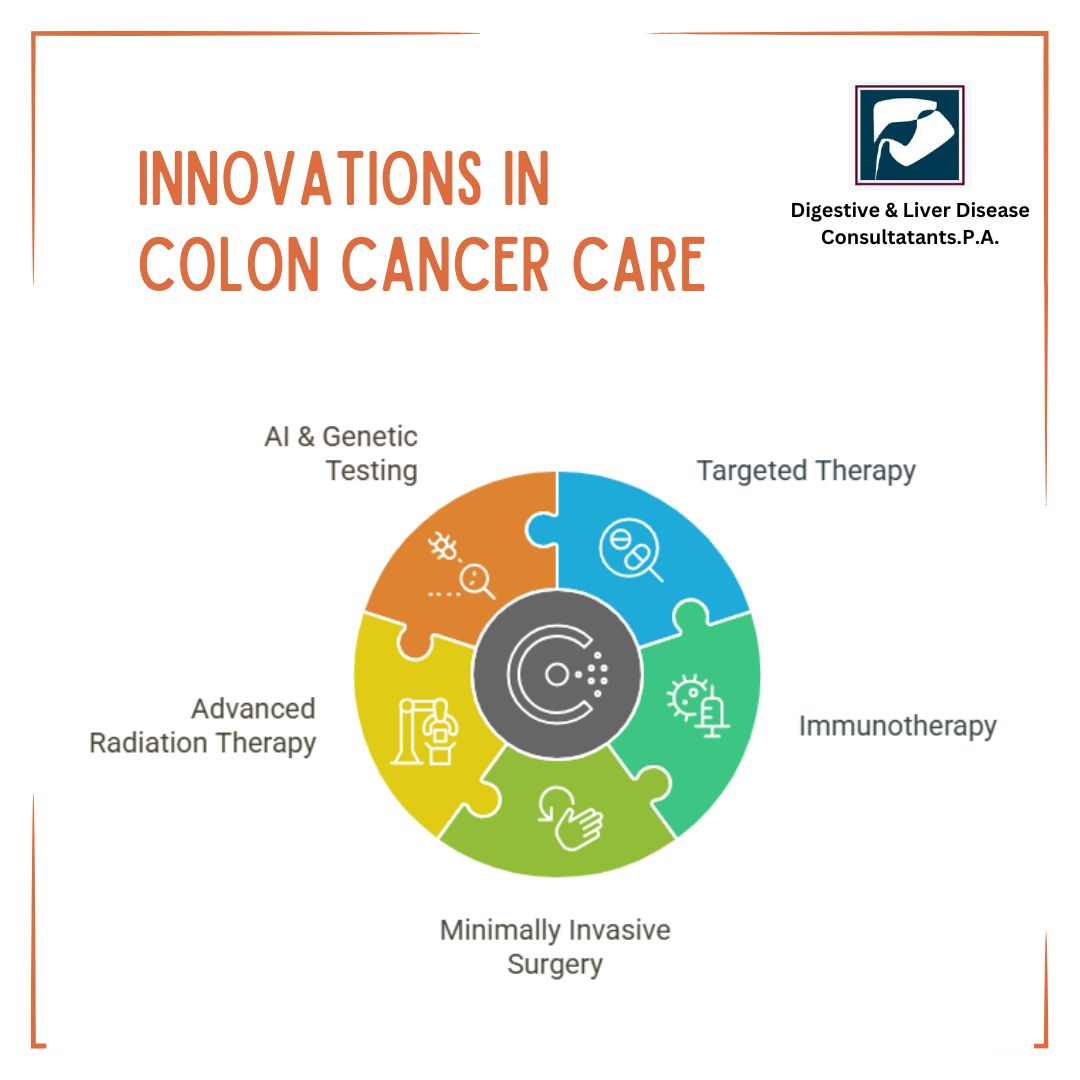Colon cancer is one of the most common types of cancer worldwide, but thanks to medical advancements, treatment options have improved significantly. Early detection and innovative therapies are making a huge difference in survival rates and quality of life for patients.
At Digestive & Liver Disease Consultants, P.A., we are committed to providing the latest in colon cancer care, helping patients navigate their treatment journey with expert guidance and advanced medical solutions. In this blog, we’ll explore the newest breakthroughs in colon cancer treatment and how they are improving patient outcomes.
Understanding Colon Cancer
Colon cancer, also known as colorectal cancer, starts in the large intestine (colon) or rectum. It often begins as small, noncancerous growths called polyps, which can turn cancerous over time. The risk of colon cancer increases with age, poor diet, lack of exercise, smoking, excessive alcohol consumption, and a family history of the disease.
Symptoms may include:
- Changes in bowel habits (diarrhea or constipation)
- Blood in the stool
- Abdominal discomfort
- Unexplained weight loss
- Fatigue
Regular screenings, such as colonoscopies, can help detect colon cancer early, making treatment more effective.

Latest Advances in Colon Cancer Treatment
1. Immunotherapy: Harnessing the Immune System
Immunotherapy is a groundbreaking approach that helps the body’s immune system recognize and attack cancer cells. It has shown great success in treating colon cancer, particularly in patients with microsatellite instability-high (MSI-H) tumors, which have a high number of genetic mutations.
Types of Immunotherapy for Colon Cancer:
Checkpoint Inhibitors: These drugs block proteins that prevent immune cells from attacking cancer cells. Examples include Pembrolizumab (Keytruda) and Nivolumab (Opdivo).
CAR-T Cell Therapy: A newer approach where a patient’s T-cells (a type of immune cell) are modified to better fight cancer.
While immunotherapy is not effective for all colon cancer patients, it offers a promising alternative for those with specific genetic markers.
2. Targeted Therapy: Precision Medicine
Unlike traditional chemotherapy, which affects both cancerous and healthy cells, targeted therapy focuses on specific molecules involved in cancer growth. This makes treatment more effective with fewer side effects.
Common Targeted Therapy Drugs for Colon Cancer:
Bevacizumab (Avastin): Blocks blood vessel growth to cut off the tumor’s supply of oxygen and nutrients.
Cetuximab (Erbitux) and Panitumumab (Vectibix): Target proteins on cancer cells to slow tumor growth.
Doctors often combine targeted therapy with chemotherapy to enhance its effectiveness.
3. Liquid Biopsy: A Less Invasive Approach
Traditional biopsies require removing tissue from the tumor, but liquid biopsies offer a less invasive method. This test detects circulating tumor DNA (ctDNA) in the blood, providing valuable information about cancer mutations and treatment response.
Benefits of Liquid Biopsy:
- Early detection of treatment resistance
- Real-time monitoring of cancer progression
- Less discomfort compared to traditional biopsies
Liquid biopsies are paving the way for more personalized treatment strategies.
4. Minimally Invasive Surgery Techniques
Surgery remains a key treatment for colon cancer, but advancements in surgical techniques have made the process less invasive, reducing recovery time and complications.
Newer Surgical Approaches:
Laparoscopic Surgery: Small incisions are made instead of a large cut, leading to faster recovery and less pain.
Robotic-Assisted Surgery: Surgeons use robotic technology for more precise movements, reducing damage to healthy tissues.
Transanal Minimally Invasive Surgery (TAMIS): Used for early-stage rectal cancer, allowing for tumor removal without major surgery.
These techniques improve outcomes, especially for patients with early-stage colon cancer.
5. Personalized Medicine: Tailoring Treatment to Each Patient
Every patient’s cancer is unique, which is why personalized medicine is becoming the future of colon cancer treatment. This approach involves analyzing the patient’s genes, lifestyle, and tumor characteristics to create a customized treatment plan.
For example:
- Patients with specific genetic mutations (such as KRAS, NRAS, or BRAF) may receive targeted therapies.
- Those with MSI-H tumors benefit more from immunotherapy.
- Certain patients may avoid chemotherapy if their cancer shows low recurrence risk based on molecular tests.
Personalized medicine ensures that patients receive the most effective treatment with minimal side effects.
6. Advancements in Radiation Therapy
Radiation therapy is commonly used for rectal cancer or advanced colon cancer. New techniques have improved its precision, reducing damage to surrounding healthy tissues.
Latest Innovations in Radiation Therapy:
Proton Beam Therapy: Delivers radiation directly to the tumor with minimal impact on nearby organs.
Stereotactic Body Radiation Therapy (SBRT): High-dose radiation delivered in fewer sessions, improving effectiveness while reducing side effects.
These advancements make radiation therapy a safer and more targeted option for colon cancer patients.
How Digestive & Liver Disease Consultants, P.A. Can Help
At Digestive & Liver Disease Consultants, P.A., we specialize in the diagnosis and treatment of colon cancer and other gastrointestinal conditions. Our team of experienced specialists uses the latest medical advancements to provide:
- Comprehensive colon cancer screenings, including colonoscopies
- Advanced diagnostic tools, such as liquid biopsies
- Personalized treatment plans based on genetic testing
- Access to cutting-edge therapies, including immunotherapy and targeted treatments
- Minimally invasive surgical options for faster recovery
We believe in a patient-centered approach, ensuring you receive the best possible care for your digestive health.
Conclusion
The field of colon cancer treatment has made remarkable progress, offering patients more effective and less invasive treatment options than ever before. Innovations in immunotherapy, targeted therapy, liquid biopsies, and personalized medicine are transforming how colon cancer is managed, improving survival rates and quality of life.
Schedule a consultation with Digestive & Liver Disease Consultants, P.A., today and let our expert team guide you toward the best care possible.






